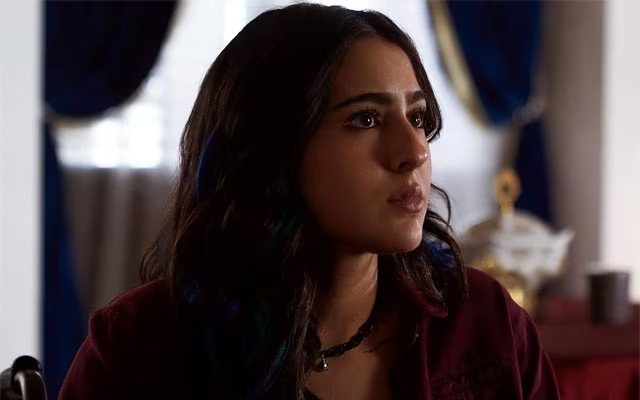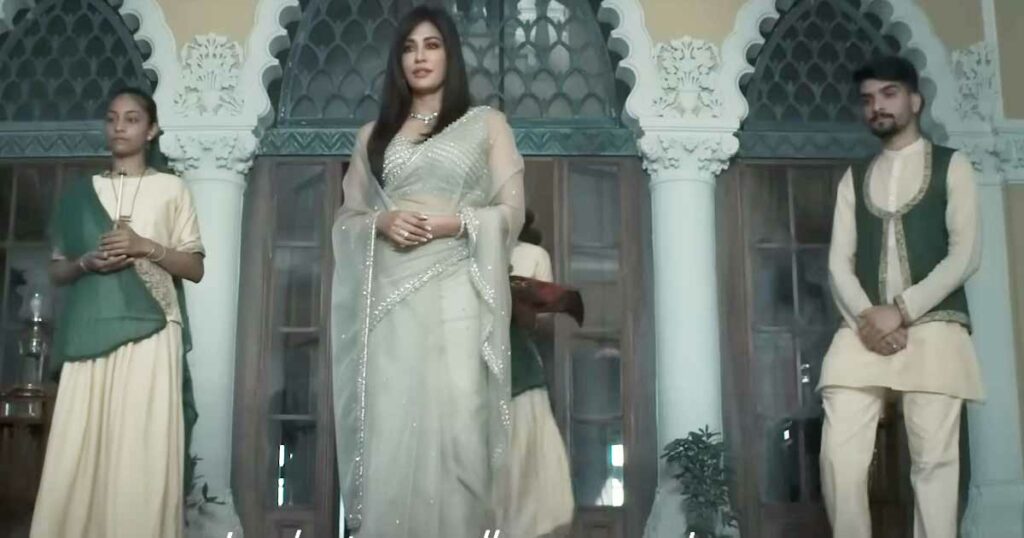Gaslight, a horror-thriller film, starring Sara Ali Khan, Vikrant Massey and Chitrangada Singh was released on March 31st, 2023, and is directed by Pavan Kirpalani.
Although the term gaslight seems to be a part of gen-z and millennial lingo, it was first popularised through the 1938 British stage play, Gaslight which was later produced as a film Gaslight in 1940, starring the beautiful Ingrid Bergman, more famously known for her role in Casablanca and Charles Boyer. In this film, a manipulative husband drives his wife to the point of insanity by convincing her she is a kleptomaniac, in an attempt to rob her of her family jewels.
Coming back to 2023, Meesha (Sara Ali Khan) returns to her ancestral home, Mayagarh Palace, to reconnect with the king, her father, after cutting him out of her life. Here, she meets Rukmani, her stepmother, who she bitterly resents for breaking up her family. She is immediately suspicious of her as her dear father is nowhere to be seen on her arrival back home, supposedly a joyous occasion.
Although it holds the motive of plot convenience, it has become all too common for films to lean into the trope of the ‘wicked stepmother.’ The origins of this role stem from fairy tales of 19th-century society, which do hold a kernel of truth reflective of the social circumstances at the time. Birth rates were extremely low as a result of women dying in childbirth, leaving them with only paternal care.
The evil stepmother emerged as more of a cautionary tale to men, to provoke them to protect and care for their children post the death of their wives, or else there would be dire consequences. The stories also provided a medium for the portrayal of taboo feelings such as maternal rage and resentment. As stepmothers were usually of a young age, there would be feelings of competition, rivalry and jealousy as is seen in the fairy tales of Cinderella and Snow White.

As society evolved and progressed, the lines of fiction and reality blurred, creating the trope of the ‘wicked stepmother’. This myth continues to thrive with the culturally dominant ideal of the biological parent-child relationship. Research shows that there is little evidence that even supports this trope.
“The majority of stepmothers get along well with their stepchildren,” says Ganong, who has read nearly 3,000 research reports on the topic, and talked to more step-family members than he can count. “Wicked stepmothers don’t show up in the data,” agrees Todd Jensen, a research assistant professor at the University of North Carolina, US, who studies relational patterns between stepparents and their stepchildren. Though why films even today use this trope today, owes its explanation to the portrayal of women characters and the subtle misogyny that Bollywood has harboured over the years and still encourages.

Throughout the film, Meesha is worried that her father is missing or worse, dead. As her suspicions are heightened, she believes her stepmother is gaslighting her into making her think that he is still alive and simply away for business. At every instance that Meesha believes she gets a glimpse of her father, his body conveniently disappears. She is determined to hold on to reality, fearful that people will believe her mental health to be deteriorating.
While it is later revealed that Rukmani is pregnant with another man’s child, the suspicions of Meesha are confirmed. However, in a classic twist, it is the caretaker of the estate, Kapil, a close companion of the king, who is responsible for his murder. In the end, Rukmani is remorseful and is only concerned about the welfare of her unborn baby, yet in a harrowed tussle with Kapil, is shot and dies. It is clear that the murder of the king is driven by the motives of Kapil.
Chitrangada Singh acts brilliantly although cast in a very stereotypical role. It is high time to let go of the ‘wicked stepmother’ as the trope is as old and dried out as the characters from the fairy tales that they come from. Although it provides the spicy drama and tension that films believe is required for the plot to move forward in an entertaining manner, there are other ways to do so instead of making the stepmother the butt of all jokes.

The most interesting character of the film seems to be Kapil, an amazing performance by Vikrant Massey. Kapil works for the king, looking after the estate and assisting the family in whatever they need. Meesha forms a close friendship with him, through their common love of the king, as they are both determined to close in on his whereabouts. Kapil is always at her side, assisting her in her search, confirming her suspicions and providing her with additional information, even developing a romantic relationship with her.
Kapil is indebted to the king for his education, and his job and is grateful to him for helping him overcome his meagre background. It paints the image of the king, of Meesha’s beloved Daata, as a generous, righteous and kind ruler, using his wealth for the upliftment of others.

Yet, this myth is debunked as this golden image of the king is slowly deconstructed at the end. It is revealed that Daata is not all that perfect, as most believed him to be. An unfaithful husband as is implied by the local police inspector and an elitist who had Kapil publicly shamed when he tried on the King’s suit. The infidelity of upper-class men has become an extremely normalised if not frequent occurrence in media and is almost a given fact. It is an extremely common and ironic reaction however if anyone else does the same.
Kapil is villainised as the ‘bad guy‘ who Meesha defeats while the dead King remains innocent and even revered at the end of the film, and the palace is used as a home for orphans, a convenient cover-up for his bad deeds.
The King allegedly had affairs with several women and when Rukmani was caught doing the same, loses his temper which gets him into a fight with Kapil where he gets murdered. This toxic entitlement of upper-class men is quietly brushed over in the film. In the end, Kapil has a dramatic monologue which illustrates his anger and frustration at the King’s sense of entitlement and patronising behaviour. His supposed generosity was simply mistaken for feeding his ego and superiority.
Also Read: Tu Jhuti Mai Makkar: Modern Indian Woman, Marriage And Mayhem
However, this too is revealed right at the climax towards the end of the film and is never truly explored. Due to the quick and very brief reveals, it is never actually openly addressed by Meesha or even Rukmani for that matter. Instead, Kapil is villainised as the ‘bad guy‘ who Meesha defeats while the dead King remains innocent and even revered at the end of the film, and the palace is used as a home for orphans, a convenient cover-up for his bad deeds.

These two aspects provide an insight into the class divide and the entitlement of the rich; however, it is brushed over, keeping an individual of the lower class as the antagonist and therefore not really bringing up any effective social commentary. It would have been a refreshing take to see this aspect more deeply explored.
Also Read: Gulmohar: A Beautifully Crafted Tale On Family And Identity
Gaslight has received an overall mixed review, due to its reused storyline, classic twist and weak plot. The still cinematography, the usage of the chiaroscuro effect in the horror scenes with the King’s silhouette, the self-playing piano and the flashes of lightning during the climactic point do enhance the elements of the thriller as well as the great performances by the main characters, especially Vikrant Massey.
Gaslight sparked a flame for a potentially good thriller yet sadly seemed to fall short.





